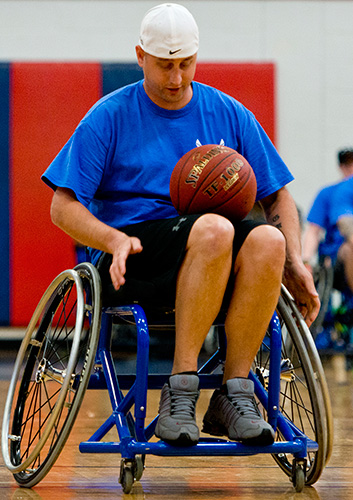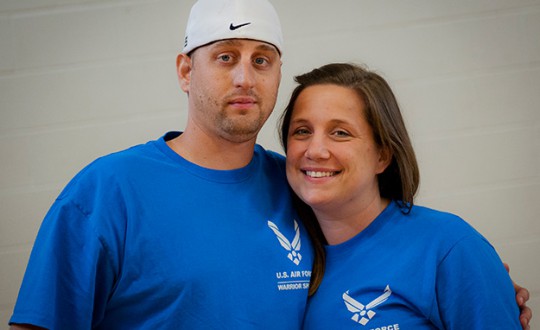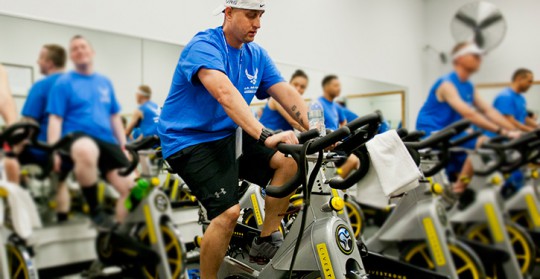Caregivers Mirror Wounded Warrior Struggles
June 28, 2015
Megan Fugitt was enjoying life as a newly-wed when in an instant, she went from being a wife to a caregiver.
Fugitt’s husband, Chris, a former Airman with the 96th Maintenance Squadron at Eglin Air Force Base, was on the mend of a kidney renal infarction in 2013 when he suddenly suffered a stroke as a result of blood thinners he was taking for his condition. The entire right side of his body was immediately paralyzed.
“He was wheelchair bound, couldn’t talk, couldn’t feed himself. He couldn’t do anything for himself without me,” said Fugitt, 28. “He had to relearn to do everything.”
To make matters worse, Chris had a pre-existing heart condition that made him susceptible to additional illnesses. Shortly after his stroke, he suffered through endocarditis, an inflammation of the inner layer of the heart, and an infection in his stomach, both resulting from cat scratch fever.
“He had to have a heart valve replacement, then open heart surgery. He recovered from that, did all sorts of rehab, and then had surgery to fix the stomach infection,” she said.
 Since then, Fugitt’s life hasn’t been remotely similar to the one she once knew.
Since then, Fugitt’s life hasn’t been remotely similar to the one she once knew.
“I had to quit working, because there was no time between his appointments. He has five to 10 appointments every week, and they’re anywhere from here to Pensacola, Panama City and Birmingham.”
Chris’s regular rehabilitation regiment includes speech, physical, occupational and mental-health therapy.
“As his caregiver, I help him out with everything. We also have a son who was two at the time – he’s four now,” said Fugitt. “[Chris] was the dad who was very involved, and now it’s me taking care of our family, because he’s not able to.”
Her husband’s recovery care coordinator suggested he participate in the Air Force’s Wounded Warrior Program introductory adaptive sports and rehabilitation camp here to help in his recovery process. Little did Fugitt know, the camp would benefit her as well.
“Since we’ve been here, one thing that’s been really nice is he’s in this place where he’s able to feel comfortable with other people. Most of the time, I’ll go and run errands, and he’ll call and text me asking me when I’ll be home,” she said. “Finally, I’ve had my own time to just relax and not worry if something’s wrong with him, because I know he’s in a good place.”
The program provides support to caregivers of wounded warriors through activities scheduled during the camp to allow for them to have some time away from their hectic lives.
“The caregivers are the mirror to the warriors’ life changing experiences,” said Tonya McGough, Air Force Wounded Warrior caregiver program manager. “If they can’t keep their warriors positive and on the go to where they can transition to a new normal, then that’s when the chaos starts. If the warriors are good, then the caregivers are good.”
Throughout the camp, caregivers were afforded opportunities to break away from their busy schedules and focus on themselves through “me time” activities. Caregivers participated in a museum tour, yoga, water sports and a peer forum.
“Activities such as the peer forums are Air Force-wide and were developed for the caregivers as an outlet, so they have a place to go to connect with other caregivers with similar stories from across the world,” said McGough.
“It’s a healing process for the caregivers as well. When they’re struggling, they tend to hold on to things, and they don’t have an outlet or the opportunity to talk to anyone. We have many resources for them to open up,” she said.
Caregivers are also provided access to supporting agencies such as family services, employment assistance, financial support and resiliency counseling. Many of the services are offered virtually to increase accessibility to caregivers who may be otherwise unable to attend.
“These caregivers and warriors have a long fight, and I know they can do this on their own,” said McGough. “When they have the support of their leadership and their families, that helps give them the courage to move forward and not look back.”
The Fugitts plan to continue to participate in the camps, to include going as far as getting the different sports equipment needed for the activities Chris is interested in, so he can practice from home in the meantime.
“We finally found some people who are in the same area of life that we are. It’s absolutely amazing to be around other people that know what’s going on,” said Fugitt. “It feels like our life is going to move on. There’s actually something to look forward to.”
By Jasmine Porterfield
USAF photos by Samuel King Jr. for NorthEscambia.com, click to enlarge.
Comments
4 Responses to “Caregivers Mirror Wounded Warrior Struggles”





I agree with mq. It’s wonderful that there’s a place for our wounded military to go for help along with their care givers.I’ll be praying for the Fugitt family.
Very impressed with Wounded Warriors. Our vets do not get the care and attention they deserve from our government. They give all they have, and then are forgotten when they get home. God bless this couple and the rest of our wounded heroes.
Too bad it is not open to all Americans.
Blood thinners are nasty business and can cause all sorts of problems, even when regulated and used properly. My best wishes to him and his family.